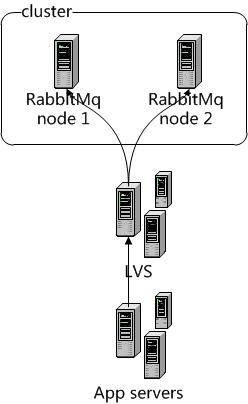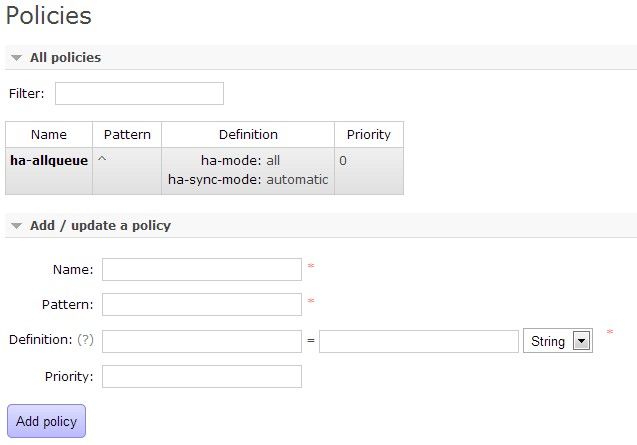- 消息中间件有哪些常见类型
xmh-sxh-1314
java
消息中间件根据其设计理念和用途,可以大致分为以下几种常见类型:点对点消息队列(Point-to-PointMessagingQueues):在这种模型中,消息被发送到特定的队列中,消费者从队列中取出并处理消息。队列中的消息只能被一个消费者消费,消费后即被删除。常见的实现包括IBM的MQSeries、RabbitMQ的部分使用场景等。适用于任务分发、负载均衡等场景。发布/订阅消息模型(Pub/Sub
- 06选课支付模块之基于消息队列发送支付通知消息
echo 云清
学成在线javarabbitmq消息队列支付通知学成在线
消息队列发送支付通知消息需求分析订单服务作为通用服务,在订单支付成功后需要将支付结果异步通知给其他对接的微服务,微服务收到支付结果根据订单的类型去更新自己的业务数据技术方案使用消息队列进行异步通知需要保证消息的可靠性即生产端将消息成功通知到服务端:消息发送到交换机-->由交换机发送到队列-->消费者监听队列,收到消息进行处理,参考文章02-使用Docker安装RabbitMQ-CSDN博客生产者确
- 在RabbitMQ中四种常见的消息路由模式
Xwzzz_
rabbitmq分布式
1.Fanout模式Fanout模式的交换机是扇出交换机(FanoutExchange),它会将消息广播给所有绑定到它的队列,而不考虑消息的内容或路由键。工作原理:生产者发送消息到FanoutExchange。FanoutExchange会将消息广播给所有绑定到它的队列,所有绑定的队列都会收到这条消息。消费者监听绑定的队列,处理收到的消息。特点:没有路由键:消息不需要路由键,所有绑定的队列都会接收
- 【RabbitMQ 项目】服务端:数据管理模块之绑定管理
月夜星辉雪
rabbitmq分布式
文章目录一.编写思路二.代码实践一.编写思路定义绑定信息类交换机名称队列名称绑定关键字:交换机的路由交换算法中会用到没有是否持久化的标志,因为绑定是否持久化取决于交换机和队列是否持久化,只有它们都持久化时绑定才需要持久化。绑定就好像一根绳子,两端连接着交换机和队列,当一方不存在,它就没有存在的必要了定义绑定持久化类构造函数:如果数据库文件不存在则创建,打开数据库,创建binding_table插入
- RabbitMQ生产者重复机制与确认机制
java炒饭小能手
java-rabbitmqrabbitmqjava
重复机制生产者发送消息时,出现了网络故障,导致与MQ的连接中断。为了解决这个问题,SpringAMQP提供的消息发送时的重试机制。即:当RabbitTemplate与MQ连接超时后,多次重试。需要修该发送端模块的application.yaml文件,添加下面的内容:spring:rabbitmq:connection-timeout:1s#设置MQ的连接超时时间template:retry:ena
- Kafka 基础与架构理解
StaticKing
KAFKAkafka
目录前言Kafka基础概念消息队列简介:Kafka与传统消息队列(如RabbitMQ、ActiveMQ)的对比Kafka的组件Kafka的工作原理:消息的生产、分发、消费流程Kafka系统架构Kafka的分布式架构设计Leader-Follower机制与数据复制Log-basedStorage和持久化Broker间通信协议Zookeeper在Kafka中的角色总结前言Kafka是一个分布式的消息系
- 【RabbitMQ 项目】服务端数据管理模块之交换机管理
月夜星辉雪
rabbitmqoracle数据库
文章目录一.编写思路二.代码实践一.编写思路定义交换机类型直接交换广播交换主题交换定义交换机名字类型是否持久化定义交换机持久化类(持久化到sqlite3)构造函数(只能成功,不能失败)如果数据库(文件)不存在则创建打开数据库打开exchange_table数据库表插入交换机移除交换机将数据库中的交换机恢复到内存中传入一个哈希表,key为名字,value为交换机的智能指针,填充该哈希表定义交换机管理
- 【仿RabbitMQ消息队列项目day2】使用muduo库中基于protobuf的应用层协议进行通信
月夜星辉雪
rabbitmq网络分布式c++后端服务器linux
一.什么是muduo?muduo库是⼀个基于非阻塞IO和事件驱动的C++高并发TCP网络编程库。简单来理解,它就是对原生的TCP套接字的封装,是一个比socket编程接口更好用的编程库。二.使用muduo库完成一个英译汉翻译服务TranslateServer.hpp:#pragmaonce#include#include#include#include#include"muduo/net/TcpC
- rabbitmq
楚楚ccc
Java系列rabbitmq分布式
1.消息服务概述、rabbitmq核心概念消息服务概述:大多数应用中,可通过消息服务中间件来提升系统异步通信,扩展解耦能力两个重要概念:消息代理(messagebroker)和目的地(destination)。当消息发送者者发出消息后,将由消息代理接管,消息代理保证将消息传递至目的地两种形式的目的地:队列(queue):点对点的消息通信(point-to-point)主题(topic):发布(pu
- 使用 RabbitMQ 实现秒杀订单系统的异步消息处理
c137范特西
rabbitmq分布式
使用RabbitMQ实现秒杀订单系统的异步消息处理在秒杀系统中,如何确保高并发环境下的订单处理稳定高效是个很大的挑战。为了解决这个问题,我们通常会引入消息队列,通过异步处理来削峰填谷。这篇文章将详细讲解如何使用RabbitMQ来设计一个秒杀订单系统的异步消息处理流程,重点是如何使用交换机(Exchange)、队列(Queue)、路由键(RoutingKey)以及死信队列(DeadLetterQue
- RabbitMQ 手册 - "Hello World"
乡间IT学者
英文原文链接介绍准备本手册假定RabbitMQ已经安装并且运行在本机,监听了标准的5672端口。如果你使用了不同的主机,端口或者凭证,连接设置也需要相应地调整。从哪里获取帮助如果你在阅读本手册有任何困惑,可以通过邮件列表联系我们RabbitMQ是一个消息代理:它接受并转发消息。你可以认为他是一个邮局:当你在邮箱放了一封你想邮送的信件,你可以确定某个邮递员最终会将邮件送达给收件人。在这个类比中,Ra
- 解决** (ArgumentError) argument error (stdlib) io_lib.erl:187: :io_lib.format(‘ * effective user\‘
独角戏 满天星
java
解决**(ArgumentError)argumenterror(stdlib)io_lib.erl:187::io_lib.format(’*effectiveuser’shomedirectory:sn’,[[67,58,92,85,115,101,114,115,92,24352,21344,35946]])的问题话不多上记录错误信息更改RabbitMQ的工作路径其中D:\RabbitMQ就
- 分布式中间件-几个常用的消息中间件
问道飞鱼
分布式技术分布式中间件
文章目录常见消息中间件1.RabbitMQ2.ApacheKafka3.RedisPub/Sub4.ActiveMQ5.AmazonSimpleNotificationService(SNS)和SimpleQueueService(SQS)6.RocketMQ差异总结消息协议1.AMQP(AdvancedMessageQueuingProtocol)2.STOMP(SimpleTextOrient
- 怎么连接服务器修改mq,如何连接远程RabbitMQ服务器
weixin_39602637
怎么连接服务器修改mq
我要建立一个应用程序(Asp.netC#)连接位于另一个国家/地区的RabbitMQ服务器。我已经从NuGet包安装了RabbitMQ客户端。在我的本地机器上运行RabbitMQ服务需要这个吗?需要在本地机器上安装RabbitMQ服务器吗?从客户那里得到的一些参数用户名、密码、主机名、带有私钥的证书。我很想知道从本地主机应用程序连接服务器的基本步骤是什么。有人能提供博客参考吗?我已经尝试了不同的步
- Docker安装RabbitMQ【单机】
时光不负所望
Linuxrabbitmqdocker
#RABBITMQ_DEFAULT_USER账号#RABBITMQ_DEFAULT_PASS密码#18090:15672管理端口18090改为15672#8090:5672数据端口8090改为5672dockerrun-d--namerabbitmq-eRABBITMQ_DEFAULT_USER=admin-eRABBITMQ_DEFAULT_PASS=123456,-p18090:15672-p
- 消息总线RabbitMQ
Crystalqy
微服务消息队列rabbitmq
RabbitMQ是实现了高级消息队列协议(AMQP)的开源消息代理软件,也称为面向消息的中间件,是一个在AMQP基础上完整的,可复用的企业消息系统。它可以用于大型软件系统各个模块之间的高效通信,支持高并发,支持可扩展。AMQP,即AdvancedMessageQueuingProtocol,一个提供统一消息服务的应用层标准高级消息队列协议,是应用层协议的一个开放标准,为面向消息的中间件设计,它定义
- RocketMQ复习
slh别学了
微服务rocketmq微服务java
之前写的博客太杂,最近想把RocketMQ的知识点再系统的过一遍,带着自己的理解使用简短的话把一些问题总结一下,尤其是开发中和面试中的高频问题,基础知识点可以参考之前写的一些博客,这篇不再赘述。SpringCloud入门(3)RabbitMQRocketMQ学习(1)快速入门RocketMQ学习(2)深入学习RocketMQ学习(3)秒杀实战目录MQ技术对比基本概念(消费者组、订阅关系等)消费模式
- RabbitMQ学习笔记
我叫奈奈
RabbitMQ相关接受mq消息//接收//需要手动创建queueName的消息队列@RabbitListener(queues="queueName")发送mq消息//发送//@AutowiredprivateAmqpTemplateamqpTemplate//第一个参数时队列名称,剩下的是参数列表publicvoidsend(){ampqTemplate.convertAndSend("que
- 【SpringBoot MQ 系列】RabbitListener 消费基本使用姿势介绍
一灰灰blog
SpringBoot专题SpringBootRabbitMQ基础教程rabbitmqspringjava队列
【MQ系列】RabbitListener消费基本使用姿势介绍之前介绍了rabbitmq的消息发送姿势,既然有发送,当然就得有消费者,在SpringBoot环境下,消费可以说比较简单了,借助@RabbitListener注解,基本上可以满足你90%以上的业务开发需求下面我们来看一下@RabbitListener的最最常用使用姿势I.配置首先创建一个SpringBoot项目,用于后续的演示spring
- @rabbitlistener注解
小小懒懒
RabbitMQ
@RabbitListener是SpringAMQP(AdvancedMessageQueuingProtocol)框架中的一个注解,用于创建RabbitMQ消息监听器。RabbitMQ是一个开源的消息代理和队列服务器,它实现了AMQP协议,用于在分布式系统中进行消息传递。SpringAMQP是Spring框架对RabbitMQ的集成,提供了方便的消息发送和接收的功能。通过使用@RabbitLis
- 4.3万字详解PHP+RabbitMQ(AMQP协议、通讯架构、6大模式、交换机队列消息持久化、死信队列、延时队列、消息丢失、重复消费、消息应答、消息应答、发布确认、故障转移、不公平分发、优先级、等)
小松聊PHP进阶
laravelPHPphp架构服务器中间件后端laravelrabbitmq
理论(后半部分有实操详解)哲学思考易经思维:向各国人讲述一种动物叫乌龟,要学很久的各国语言,但是随手画一个乌龟,全世界的人都能看得懂。道家思维:努力没有用(指劳神费心的机械性重复、肢体受累、刻意行为),要用心(深度思考、去感悟、透过现象看本质)才有用。举例:类似中学做不出来的几何题的底层原理:不是不知道xx定理或公式(招式),而是不知道画辅助线的思路(内功)。总结:万事万物、用道家思维思考本质与规
- 如何优雅地处理 RabbitMQ 连接中断问题
吃面不喝汤66
RabbitMQrabbitmq分布式
在使用RabbitMQ作为消息队列时,我们常常会碰到长时间运行的连接由于各种原因(网络波动、空闲时间过长等)突然中断的情况。这导致我们的消息无法正常发送,并且抛出了pika.exceptions.StreamLostError和pika.exceptions.AMQPConnectionError等异常。面对这些异常,如何优雅地处理并自动恢复连接是一个常见的技术挑战。今天我们来探讨如何在Pytho
- PHP使用rabbitMQ
每天瞎忙的农民工
php实战rabbitMQphprabbitmq
在PHP中使用RabbitMQ通常是为了处理异步任务、队列、消息推送等场景,特别是在高并发、分布式系统中,RabbitMQ提供了可靠的消息队列服务。RabbitMQ是基于AMQP协议的消息中间件,具有高效、可靠、可扩展的特点。下面将介绍如何在PHP中使用RabbitMQ,并结合场景给出实现方法。一、RabbitMQ基础概念Producer(生产者):发送消息的客户端,负责将消息发送到消息队列。Co
- RabbitMQ安装 以及 Spring Boot整合
RealGUO
笔记rabbitmqjava
SpringBoot+整合RabbitMQ1、docker配置RabbitMQ运行环境dockerpullrabbitmq:management#tag为management版本的rabbitmq#运行容器dockerrun-dit--namerabbitmq01-eRABBITMQ_DEFAULT_USER=admin-eRABBITMQ_DEFAULT_PASS=admin-p15672:15
- Ubuntu中安装RabbitMQ
不爱开发的干饭人
ubunturabbitmqlinux
1.安装sudoaptinstallrabbitmq-server2.检查状态systemctlstatusrabbitmq-server#检查状态servicerabbitmq-serverstatus#检查状态3.开启Web管理sudorabbitmq-pluginsenablerabbitmq_management4.打开浏览器输入网址http://localhost:15672#用默认gu
- 深入探讨 RabbitMQ 的整体架构:消息传递的核心机制
需要重新演唱
rabbitmq架构ruby
深入探讨RabbitMQ的整体架构:消息传递的核心机制引言在现代分布式系统中,消息队列(MessageQueue)是实现异步通信和解耦的重要工具。RabbitMQ是一个广泛使用的开源消息代理,提供了可靠的消息传递机制。本文将深入探讨RabbitMQ的整体架构,帮助你理解其核心组件和工作原理。无论你是初学者还是有经验的开发者,这篇文章都将为你提供全面而深入的理解。什么是RabbitMQ?Rabbit
- Spring常用中间件
贺仙姑
spring中间件java
1.数据库中间件(1)MySQL:常用的关系型数据库,支持JDBC和JPA。(2)PostgreSQL:功能强大的开源关系型数据库,支持复杂查询。(3)MongoDB:NoSQL数据库,适合存储非结构化数据。(4)Redis:内存数据结构存储,常用于缓存和消息队列。2.消息队列(1)RabbitMQ:开源消息代理,支持多种消息协议,适合异步处理。(2)Kafka:分布式流处理平台,适合处理大规模数
- ASP.NET Core消息队列RabbitMQ基础入门实战演练
阿笨NET
跟着阿笨一起玩NETASP.NETCoreASP.NETCore消息队列ASP.NETCoreRabbitMQ.NETCore视频教程ASP.NETCore视频课程
一、课程介绍人生苦短,我用.NETCore!消息队列RabbitMQ大家相比都不陌生,本次分享课程阿笨将给大家分享一下在一般项目中99%都会用到的消息队列MQ的一个实战业务运用场景。本次分享课程不是零基础教学,课程内容的侧重点是讲解的RabbitMQ的最实用、最简单的实战运用场景:Publish/Subscrib(发布/订阅)模式,发送端发送消息,单个接收端接收处理消息。学完本次"是猴子都看的懂的
- chapter01 Java语言概述 知识点Note
月下绯烟
Javajava开发语言
JavaSEJavaEEJavaME大数据Java基础常用技术栈mysqlJDBCSSMspring+springmvc+mybatisLinuxnacosHadoopFlinkJAVAEE消息队列rabbitMQdocker数据库redisspringbootspringcloudsshstruts+spring+hibernate过时技术栈很少用JAVA虚拟机jvm分布式微服务高并发常见dos
- Windows安装RabbitMQ详细教程
赵亚旭
中间件个人开发windows
一、RabbitMQ简介RabbitMQ是一个功能强大且易于使用的开源消息代理,它支持多种消息协议(AMQP、STOMP、MQTT等),并提供了一个易用的用户界面来监控和管理消息Broker。RabbitMQ的高可靠性、灵活的路由、集群支持和多语言客户端等特点,使其成为企业级消息传递系统的理想选择。二、安装前准备在开始安装RabbitMQ之前,需要做好以下准备工作:确认系统环境:确保你的Windo
- jsonp 常用util方法
hw1287789687
jsonpjsonp常用方法jsonp callback
jsonp 常用java方法
(1)以jsonp的形式返回:函数名(json字符串)
/***
* 用于jsonp调用
* @param map : 用于构造json数据
* @param callback : 回调的javascript方法名
* @param filters : <code>SimpleBeanPropertyFilter theFilt
- 多线程场景
alafqq
多线程
0
能不能简单描述一下你在java web开发中需要用到多线程编程的场景?0
对多线程有些了解,但是不太清楚具体的应用场景,能简单说一下你遇到的多线程编程的场景吗?
Java多线程
2012年11月23日 15:41 Young9007 Young9007
4
0 0 4
Comment添加评论关注(2)
3个答案 按时间排序 按投票排序
0
0
最典型的如:
1、
- Maven学习——修改Maven的本地仓库路径
Kai_Ge
maven
安装Maven后我们会在用户目录下发现.m2 文件夹。默认情况下,该文件夹下放置了Maven本地仓库.m2/repository。所有的Maven构件(artifact)都被存储到该仓库中,以方便重用。但是windows用户的操作系统都安装在C盘,把Maven仓库放到C盘是很危险的,为此我们需要修改Maven的本地仓库路径。
- placeholder的浏览器兼容
120153216
placeholder
【前言】
自从html5引入placeholder后,问题就来了,
不支持html5的浏览器也先有这样的效果,
各种兼容,之前考虑,今天测试人员逮住不放,
想了个解决办法,看样子还行,记录一下。
【原理】
不使用placeholder,而是模拟placeholder的效果,
大概就是用focus和focusout效果。
【代码】
<scrip
- debian_用iso文件创建本地apt源
2002wmj
Debian
1.将N个debian-506-amd64-DVD-N.iso存放于本地或其他媒介内,本例是放在本机/iso/目录下
2.创建N个挂载点目录
如下:
debian:~#mkdir –r /media/dvd1
debian:~#mkdir –r /media/dvd2
debian:~#mkdir –r /media/dvd3
….
debian:~#mkdir –r /media
- SQLSERVER耗时最长的SQL
357029540
SQL Server
对于DBA来说,经常要知道存储过程的某些信息:
1. 执行了多少次
2. 执行的执行计划如何
3. 执行的平均读写如何
4. 执行平均需要多少时间
列名 &
- com/genuitec/eclipse/j2eedt/core/J2EEProjectUtil
7454103
eclipse
今天eclipse突然报了com/genuitec/eclipse/j2eedt/core/J2EEProjectUtil 错误,并且工程文件打不开了,在网上找了一下资料,然后按照方法操作了一遍,好了,解决方法如下:
错误提示信息:
An error has occurred.See error log for more details.
Reason:
com/genuitec/
- 用正则删除文本中的html标签
adminjun
javahtml正则表达式去掉html标签
使用文本编辑器录入文章存入数据中的文本是HTML标签格式,由于业务需要对HTML标签进行去除只保留纯净的文本内容,于是乎Java实现自动过滤。
如下:
public static String Html2Text(String inputString) {
String htmlStr = inputString; // 含html标签的字符串
String textSt
- 嵌入式系统设计中常用总线和接口
aijuans
linux 基础
嵌入式系统设计中常用总线和接口
任何一个微处理器都要与一定数量的部件和外围设备连接,但如果将各部件和每一种外围设备都分别用一组线路与CPU直接连接,那么连线
- Java函数调用方式——按值传递
ayaoxinchao
java按值传递对象基础数据类型
Java使用按值传递的函数调用方式,这往往使我感到迷惑。因为在基础数据类型和对象的传递上,我就会纠结于到底是按值传递,还是按引用传递。其实经过学习,Java在任何地方,都一直发挥着按值传递的本色。
首先,让我们看一看基础数据类型是如何按值传递的。
public static void main(String[] args) {
int a = 2;
- ios音量线性下降
bewithme
ios音量
直接上代码吧
//second 几秒内下降为0
- (void)reduceVolume:(int)second {
KGVoicePlayer *player = [KGVoicePlayer defaultPlayer];
if (!_flag) {
_tempVolume = player.volume;
- 与其怨它不如爱它
bijian1013
选择理想职业规划
抱怨工作是年轻人的常态,但爱工作才是积极的心态,与其怨它不如爱它。
一般来说,在公司干了一两年后,不少年轻人容易产生怨言,除了具体的埋怨公司“扭门”,埋怨上司无能以外,也有许多人是因为根本不爱自已的那份工作,工作完全成了谋生的手段,跟自已的性格、专业、爱好都相差甚远。
- 一边时间不够用一边浪费时间
bingyingao
工作时间浪费
一方面感觉时间严重不够用,另一方面又在不停的浪费时间。
每一个周末,晚上熬夜看电影到凌晨一点,早上起不来一直睡到10点钟,10点钟起床,吃饭后玩手机到下午一点。
精神还是很差,下午像一直野鬼在城市里晃荡。
为何不尝试晚上10点钟就睡,早上7点就起,时间完全是一样的,把看电影的时间换到早上,精神好,气色好,一天好状态。
控制让自己周末早睡早起,你就成功了一半。
有多少个工作
- 【Scala八】Scala核心二:隐式转换
bit1129
scala
Implicits work like this: if you call a method on a Scala object, and the Scala compiler does not see a definition for that method in the class definition for that object, the compiler will try to con
- sudoku slover in Haskell (2)
bookjovi
haskellsudoku
继续精简haskell版的sudoku程序,稍微改了一下,这次用了8行,同时性能也提高了很多,对每个空格的所有解不是通过尝试算出来的,而是直接得出。
board = [0,3,4,1,7,0,5,0,0,
0,6,0,0,0,8,3,0,1,
7,0,0,3,0,0,0,0,6,
5,0,0,6,4,0,8,0,7,
- Java-Collections Framework学习与总结-HashSet和LinkedHashSet
BrokenDreams
linkedhashset
本篇总结一下两个常用的集合类HashSet和LinkedHashSet。
它们都实现了相同接口java.util.Set。Set表示一种元素无序且不可重复的集合;之前总结过的java.util.List表示一种元素可重复且有序
- 读《研磨设计模式》-代码笔记-备忘录模式-Memento
bylijinnan
java设计模式
声明: 本文只为方便我个人查阅和理解,详细的分析以及源代码请移步 原作者的博客http://chjavach.iteye.com/
import java.util.ArrayList;
import java.util.List;
/*
* 备忘录模式的功能是,在不破坏封装性的前提下,捕获一个对象的内部状态,并在对象之外保存这个状态,为以后的状态恢复作“备忘”
- 《RAW格式照片处理专业技法》笔记
cherishLC
PS
注意,这不是教程!仅记录楼主之前不太了解的
一、色彩(空间)管理
作者建议采用ProRGB(色域最广),但camera raw中设为ProRGB,而PS中则在ProRGB的基础上,将gamma值设为了1.8(更符合人眼)
注意:bridge、camera raw怎么设置显示、输出的颜色都是正确的(会读取文件内的颜色配置文件),但用PS输出jpg文件时,必须先用Edit->conv
- 使用 Git 下载 Spring 源码 编译 for Eclipse
crabdave
eclipse
使用 Git 下载 Spring 源码 编译 for Eclipse
1、安装gradle,下载 http://www.gradle.org/downloads
配置环境变量GRADLE_HOME,配置PATH %GRADLE_HOME%/bin,cmd,gradle -v
2、spring4 用jdk8 下载 https://jdk8.java.
- mysql连接拒绝问题
daizj
mysql登录权限
mysql中在其它机器连接mysql服务器时报错问题汇总
一、[running]
[email protected]:~$mysql -uroot -h 192.168.9.108 -p //带-p参数,在下一步进行密码输入
Enter password: //无字符串输入
ERROR 1045 (28000): Access
- Google Chrome 为何打压 H.264
dsjt
applehtml5chromeGoogle
Google 今天在 Chromium 官方博客宣布由于 H.264 编解码器并非开放标准,Chrome 将在几个月后正式停止对 H.264 视频解码的支持,全面采用开放的 WebM 和 Theora 格式。
Google 在博客上表示,自从 WebM 视频编解码器推出以后,在性能、厂商支持以及独立性方面已经取得了很大的进步,为了与 Chromium 现有支持的編解码器保持一致,Chrome
- yii 获取控制器名 和方法名
dcj3sjt126com
yiiframework
1. 获取控制器名
在控制器中获取控制器名: $name = $this->getId();
在视图中获取控制器名: $name = Yii::app()->controller->id;
2. 获取动作名
在控制器beforeAction()回调函数中获取动作名: $name =
- Android知识总结(二)
come_for_dream
android
明天要考试了,速速总结如下
1、Activity的启动模式
standard:每次调用Activity的时候都创建一个(可以有多个相同的实例,也允许多个相同Activity叠加。)
singleTop:可以有多个实例,但是不允许多个相同Activity叠加。即,如果Ac
- 高洛峰收徒第二期:寻找未来的“技术大牛” ——折腾一年,奖励20万元
gcq511120594
工作项目管理
高洛峰,兄弟连IT教育合伙人、猿代码创始人、PHP培训第一人、《细说PHP》作者、软件开发工程师、《IT峰播》主创人、PHP讲师的鼻祖!
首期现在的进程刚刚过半,徒弟们真的很棒,人品都没的说,团结互助,学习刻苦,工作认真积极,灵活上进。我几乎会把他们全部留下来,现在已有一多半安排了实际的工作,并取得了很好的成绩。等他们出徒之日,凭他们的能力一定能够拿到高薪,而且我还承诺过一个徒弟,当他拿到大学毕
- linux expect
heipark
expect
1. 创建、编辑文件go.sh
#!/usr/bin/expect
spawn sudo su admin
expect "*password*" { send "13456\r\n" }
interact
2. 设置权限
chmod u+x go.sh 3.
- Spring4.1新特性——静态资源处理增强
jinnianshilongnian
spring 4.1
目录
Spring4.1新特性——综述
Spring4.1新特性——Spring核心部分及其他
Spring4.1新特性——Spring缓存框架增强
Spring4.1新特性——异步调用和事件机制的异常处理
Spring4.1新特性——数据库集成测试脚本初始化
Spring4.1新特性——Spring MVC增强
Spring4.1新特性——页面自动化测试框架Spring MVC T
- idea ubuntuxia 乱码
liyonghui160com
1.首先需要在windows字体目录下或者其它地方找到simsun.ttf 这个 字体文件。
2.在ubuntu 下可以执行下面操作安装该字体:
sudo mkdir /usr/share/fonts/truetype/simsun
sudo cp simsun.ttf /usr/share/fonts/truetype/simsun
fc-cache -f -v
- 改良程序的11技巧
pda158
技巧
有很多理由都能说明为什么我们应该写出清晰、可读性好的程序。最重要的一点,程序你只写一次,但以后会无数次的阅读。当你第二天回头来看你的代码 时,你就要开始阅读它了。当你把代码拿给其他人看时,他必须阅读你的代码。因此,在编写时多花一点时间,你会在阅读它时节省大量的时间。
让我们看一些基本的编程技巧:
尽量保持方法简短
永远永远不要把同一个变量用于多个不同的
- 300个涵盖IT各方面的免费资源(下)——工作与学习篇
shoothao
创业免费资源学习课程远程工作
工作与生产效率:
A. 背景声音
Noisli:背景噪音与颜色生成器。
Noizio:环境声均衡器。
Defonic:世界上任何的声响都可混合成美丽的旋律。
Designers.mx:设计者为设计者所准备的播放列表。
Coffitivity:这里的声音就像咖啡馆里放的一样。
B. 避免注意力分散
Self Co
- 深入浅出RPC
uule
rpc
深入浅出RPC-浅出篇
深入浅出RPC-深入篇
RPC
Remote Procedure Call Protocol
远程过程调用协议
它是一种通过网络从远程计算机程序上请求服务,而不需要了解底层网络技术的协议。RPC协议假定某些传输协议的存在,如TCP或UDP,为通信程序之间携带信息数据。在OSI网络通信模型中,RPC跨越了传输层和应用层。RPC使得开发

